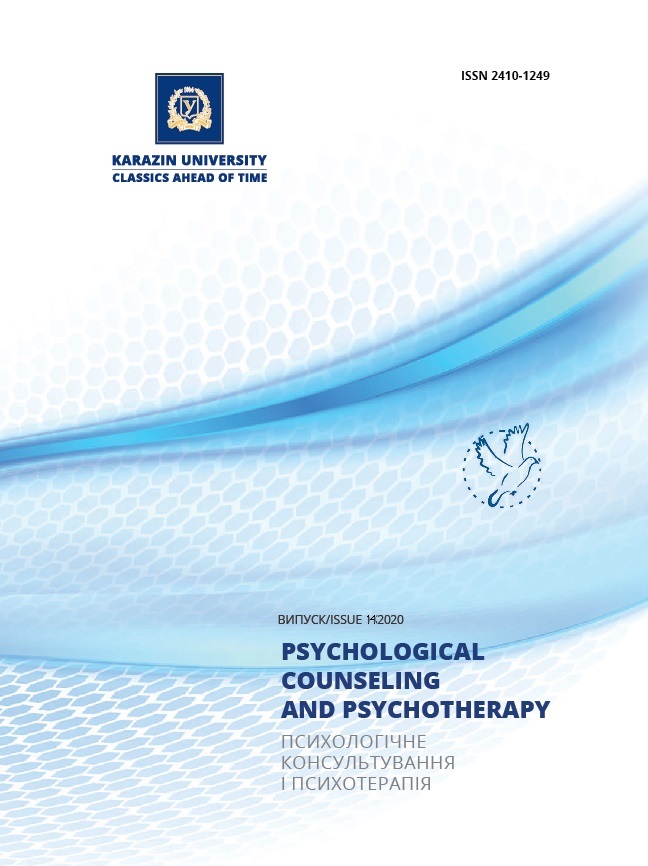Features of Narcissistic Regulation of Drug Abuse Personality
Abstract
The article presents the results of a study of the characteristics of narcissistic regulation of drug addicts. The aim of the study is to investigate the features of narcissistic regulation of drug addicts as forms of borderline personality organization and personality types of drug addicts. According to the set goal and objectives of the study, a research sample was formed. Based on informed consent in compliance with the principles of bioethics and deontology during 2019-2020. a psychodiagnostic study of 102 male patients with drug addiction of the opioid group was carried out on the basis of the "Vertical" rehabilitation center at the age of 18-26 years, and 54 healthy males at the age of 18-27 years without signs of somatic, mental pathology and drug addiction. To achieve this goal, we used the following methods: for the study of narcissistic regulation - "Index of the functioning of the Self-system" (Zalutskaya N.M. and oth., 2003); for the study of personality characterological radicals were used test "Self-portrait of personality" Jen M. Oldham and Louis B. Morris. Mathematical processing was carried out using the methods of mathematical statistics (SPSS Statistics 21): methods for checking the reliability of differences in unrelated samples (Mann-Whitney U-test). Conclusions: Narcissistic regulation of drug addicts is based on the formation of an ideal image for others, acting as a social “mask” caused to hide the terrible inner emptiness, baseness and depravity of their own “Self”. A rigid internal imperative is based on the background of parent-child relationships and levels the internal infantile dependence on the inflated expectations of parents. The personality profile of drug addicts is based on the multidimensional development of personality types, which introduce individual characteristics into the personality of drug addicts and manifest themselves under certain circumstances, indicating a conditional heterogeneity in these characteristics. The study of the interdependence of personality types with the characterological radicals of narcissistic regulation and drug addicts complements the awareness of the holistic picture of the functioning of an addictive personality. The existing correlations allow drug addicts to form compensatory mechanisms to mask their own narcissistic deficit.
Downloads
References
Національний звіт за 2019 рік щодо наркотичної ситуації (за даними 2018 року) [National report for 2019 on the drug situation (according to 2018)] (2019). https://cmhmda.org.ua/wpcontent/uploads/2020/03/Zvit_shchodo_narkotychnoi_ta_alkoholnoi_sytuatsii_v_Ukraini_za_2019_rik.pdf [in Ukrainian].
Kulakov, S.A. (2004). Практикум по клинической психологии и психотерапии подростков [Workshop on clinical psychology and psychotherapy for adolescents]. SPb. Rech` [SPb. Rech], pp. 464. [in Russian].
Shabanov, P.D., Shtakel`berg O.Yu. (2000) Наркомания: патопсихология, клиника, реабилитация [Drug addiction: pathopsychology, clinic, rehabilitation]. SPb. Izd-vo «Lan`» [SPb: Publishing house "Lan"], pp. 368. [in Russian].
Zmanovskaya, E.V. (2003) Девиантология: (пособие отклоняющегося поведения) [Deviantology: (a guide to deviant behavior]. M., pp. 134. [in Russian].
Kokhut Kh. (2017) Анализ самости. Систематический подход к лечению личности нарциссических нарушений. [Analysis of the Self. A systematic approach to the treatment of narcissistic personality disorders]. M.: Kogito-Czentr. [Moscow: Kogito-Center], pp. 368.
Denek, W., Hilgenstock, B. (2003) Методика: Тест оченки нарциссизма [Methodology: Test for assessing narcissism]. (adapttacziya Zaluczkoj N.M., Vuks A.Ya. под руководством Vida V.D.) [adaptation by Zalutskaya N.M., Vuks A.Ya. under the guidance of Weed V.D.] NIPNI im. Bekhtereva. https://sites.google.com/site/test300m/nrz
Dufner M., Gebauer J.E., Sedikides C., et al. (2019). Self-enhancement and psychological adjustment: A meta-analytic review. Personality and Social Psychology Review. 23(1), 48–72. https://doi.org/10.1177/1088868318756467 [in English].
Krizan Z., Herlache A.D. (2018). The narcissism spectrum model: A synthetic view of narcissistic personality. Personality and Social Psychology Review. 22(1), 3–31. https://doi.org/10.1177/1088868316685018.
Miller J.D., Price J., Gentile B., et al. (2012). Grandiose and vulnerable narcissism from the perspective of the interpersonal circumplex. Personality and Individual Differences. 4. 507 512. https://doi.org/10.1016/j.paid.2012.04.026.
Shherbaty`kh Yu.V. (2008). Русифицированная версия теста Олдхама-Морриса – эффективный инструмент профессионального отбора и семейного консультирования. [The Russian version of the Oldham-Morris test is an effective tool for professional selection and family counseling]. Сборник материалов региональной межвузовской конференции ВФ МГЭИ. [Collection of materials of the regional interuniversity conference of the WF IGE]. Voronezh, pp. 41-43.








